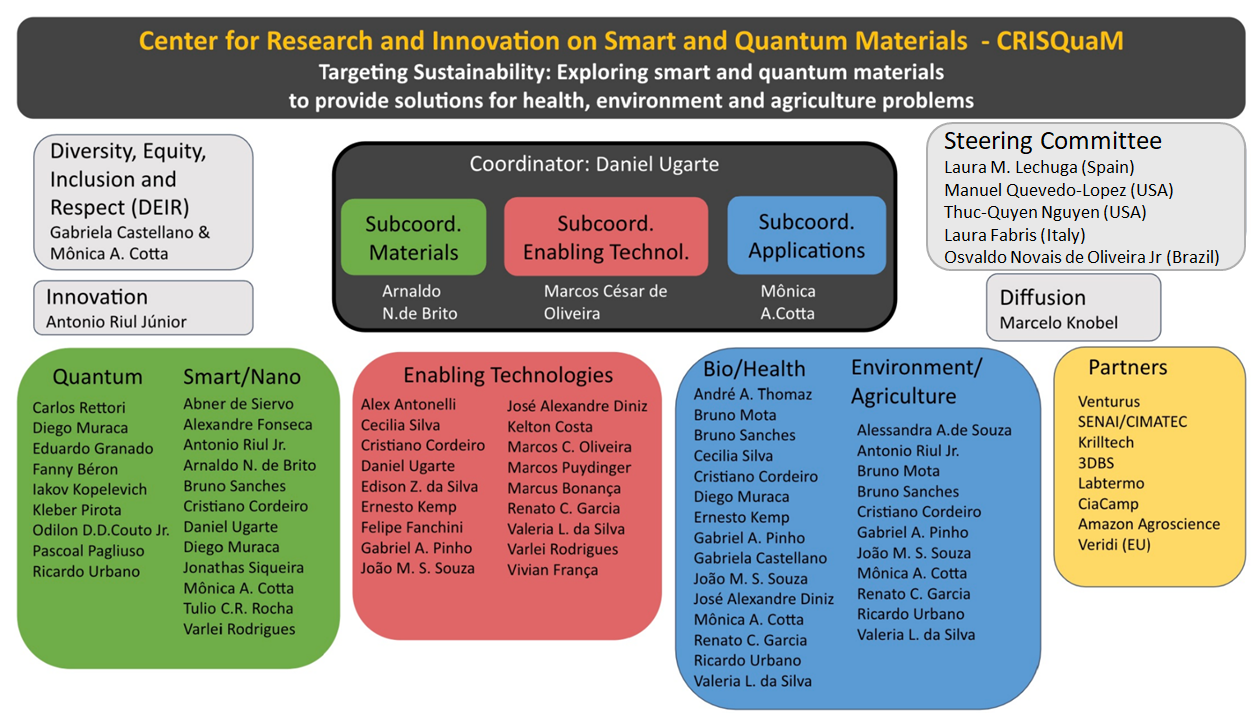BV-FAPESP: research projects supported in this Center
CRISQuaM in the Media: news about the center
CRISQuaM aims to explore the synergistic development of fundamental and applied science to create new materials with high potential for the construction of devices and sensors to address technological challenges related to sustainability, climate change, precision agriculture, ecology, and health. To achieve these goals, we have assembled an interdisciplinary and collaborative research team, integrating expertise across various scientific domains, researching novel materials with high innovation potential. By combining original synthesis methods, advanced characterization techniques, theoretical approaches, computational simulations, quantum technologies, and device construction designs, we aim to drive advances in smart and quantum materials, promoting scientific excellence and technological development. With this, we plan disruptive innovations in instrumentation—including hardware and AI-based tools—as well as in quantum technologies, biomedical devices, and signal processing, in addition to plant bionics, exploring plant-pathogen interactions. Besides research activities, we plan intensive actions in education, dissemination, and communication for the general public, as a modern society should be aware of the challenges humanity faces and how research and technology are essential for responsibly utilizing the planet's limited resources. CRISQuaM's Innovation activities are accelerated through partnerships with several companies in related technologies, many of them Brazilian. Finally, all activities of the Center are managed in accordance with diversity, equity, and inclusion goals and best practices.
The Center brings together scientists, engineers, and innovators in a collaborative effort to apply materials science and quantum technologies at the cutting edge, designing new materials and nano(bio)sensors for advanced diagnostics. The Center has a team capable of producing a wide range of (nano/micro) materials, along with precise chemical and physical characterizations using modern techniques (synchrotron, advanced microscopy, magnetotransport, magnetic resonance, optics, etc.). In addition, the team offers various options in enabling technologies, including miniaturization, processing, and additive manufacturing, as well as instrumentation, quantum sensing, and electronics development. Data analysis will employ updated approaches (numerical simulation, classical and quantum machine learning, and quantum optimization). Applications at the knowledge frontier will address urgent sustainability needs in environmental areas, precision agriculture, plant bionics, and biomedical interfaces, contributing to the development of local technologies in close partnership with the Brazilian industry.
The organization of the Center is based on three pillars — Materials, Enabling Technologies, and Applications — together with partner companies, as described in the figure below.

2023-11-29
Scientists at the State University of Campinas analyzed samples taken at 15 points in the basin comprising the Piracicaba, Capivari and Jundiaí Rivers, and detected 45 contaminants, including compounds from agricultural, industrial and household effluents not yet regulated by Brazilian legislation.
2023-11-29
A study conducted in Brazil analyzed marine sediments to investigate gas exchanges between the ocean and the atmosphere in the recent past. The researchers concluded that a rise in the temperature of the South Atlantic caused a release of CO2 trapped at the bottom of the Southern Ocean.
2023-11-29
Technology developed by a startup supported by FAPESP has been used to improve the performance of athletes like soccer goalkeeper Ederson, who plays for Manchester City and Brazil’s national side, and to reduce the number of accidents caused by human error in the petrochemical and meatpacking industries.
2023-11-27
The study by researchers at the University of São Paulo also shows that genetic engineering techniques need to be improved in order to increase ethanol production without expanding crop acreage, a strategy considered crucial to the effort to cope with climate change.
2023-11-22
Called SpiNTec, the vaccine can induce a more lasting immune response and should be more effective than vaccines currently available in Brazil against variants of the novel coronavirus SARS-CoV-2, according to the leader of the local vaccine development project, who took part in the FAPESP 2023 School in Exact and Natural Sciences, Engineering and Medicine.
2023-11-22
On a visit to São Paulo to participate in the FAPESP 2023 Interdisciplinary School in Exact and Natural Sciences, Engineering and Medicine, astrophysicist Duília de Mello argued that science popularization can combat epistemic bubbles.
2023-11-22
A group of organizations led by Woods Hole Oceanographic Institution (WHOI) and the University of California San Diego’s Scripps Institution of Oceanography have established an online platform to raise the visibility of the ocean and highlight its importance to climate negotiations and life on the planet.
2023-11-22
A computational study conducted by the Center for Development of Functional Materials at the Federal University of São Carlos (UFSCar) in Brazil could help extend the working lives of these batteries, which are widely used by utilities and manufacturers.